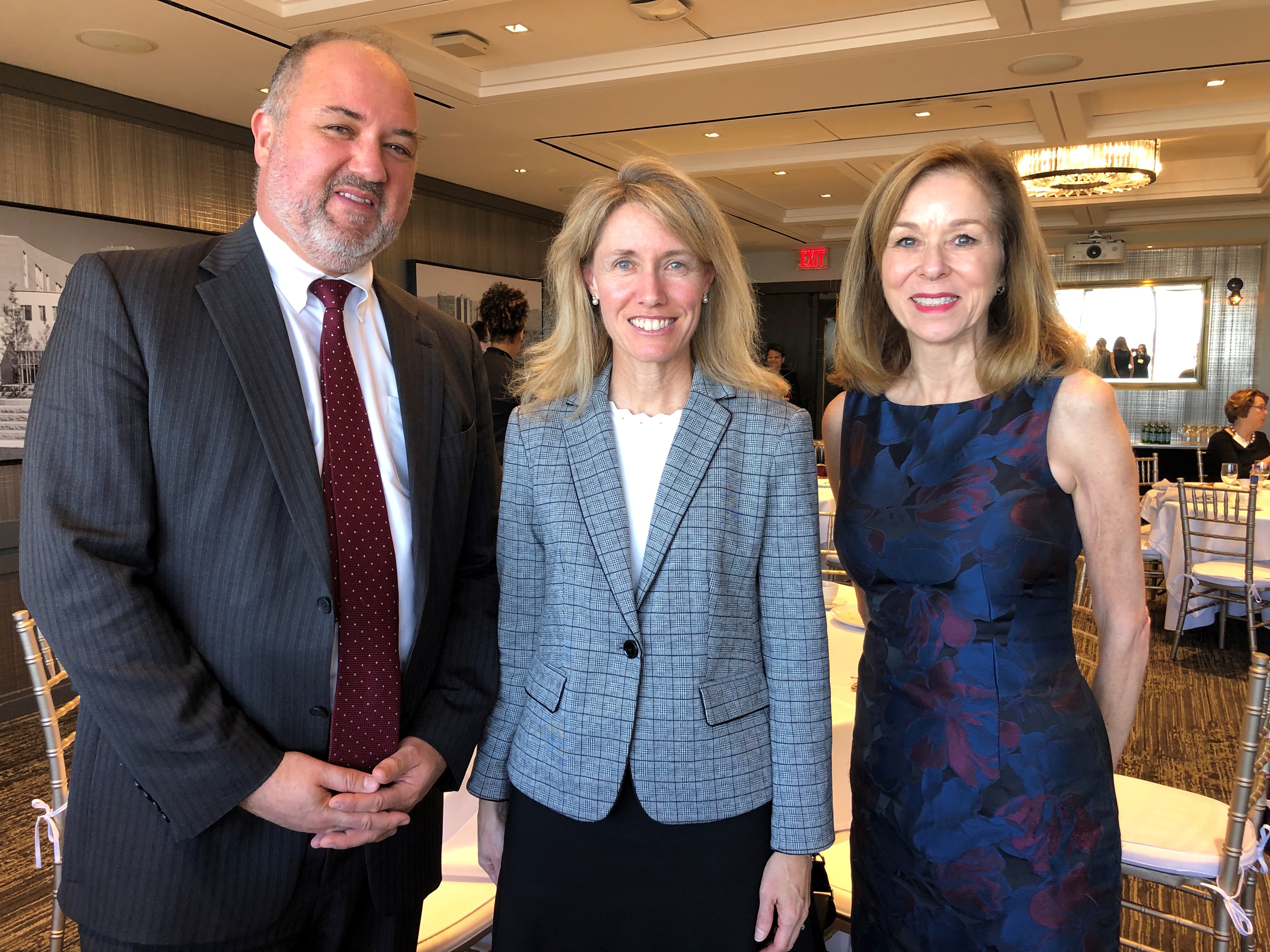Few organizations drive more positive impact for the New England economic than the Massachusetts Port Authority (Massport): 40 million passengers served yearly at Logan International Airport, 1 million tons of cargo moved through the Port of Boston, and $18 billion in total economic impact supporting more than 100,000 jobs.
Denterlein hosted newly appointed Massport CEO Lisa Wieland who shared her vision for Massport as part of Denterlein’s In the News series, moderated by Senior Advisor Peter Howe.
On one key front, our conversation couldn’t have been more timely: We spoke four days before Massport was to begin implementing major changes in how ridesharing (or “ride app,” in Massport parlance) customers will get picked up and dropped off at Logan. We also heard from Wieland on how Massport is reimagining how to get people and cargo through our airports and ports, moving to sustain the growth of service at Worcester Regional Airport, and making diversity and inclusion and placemaking core components of its real estate developments.
Ride sharing services have grown so rapidly at Logan, Wieland said, that they have overwhelmed the ground transportation system. “Last year we saw 12 million Uber and Lyft trips, 5 million of which [arrived or departed] Logan without passengers.” In efforts to reduce congestion and create the conditions to enable “rematch rides” to reduce deadheaded ride share trips by 30%, Massport plans to centralize pick-ups and drop-offs in a new area on the first floor of the central parking garage at Logan. While an initial test run the day before we spoke went well, Wieland said Massport expects some growing pains as passengers and drivers adjust to the new system and said Massport will make adjustments in real time based on data collected and public input received.
Massport believes that centralizing ride sharing operations may also generate some ridership increases for the MBTA’s Silver Line, which stops directly in front of Terminals A, B, C, and E, and Blue Line, which is connected by Massport shuttle bus to the terminals. “We are making significant investments in HOV [high occupancy vehicles] in a couple of different ways: On the Silver Line we are involved in an ongoing capacity study, we are committed to buying eight new buses, and we are making significant changes to Logan Express.’’ Wieland shared that the Braintree and Framingham Logan Express locations are “at capacity,” with all available parking typically filled on every day, and Massport is looking for another Express location, likely to the west of Boston.
The regional nature of Massport’s operations also came up; Weiland noted that three airlines now offer regular service in and out of Worcester–American, Delta, and JetBlue. As a result,Massport is increasing its marketing efforts to promote the Worcester Regional Airport, which she views as potentially “just as easy to get to” as Logan Airport for a large number of travelers in the MetroWest region.
Wieland, who was director of Massport’s maritime port operations before taking over as CEO in July, reinforced the role Boston’s working port plays in in supporting the Commonwealth’s position as a hub of global trade. “From a trade perspective we connect over 25,000 companies in New England to the global economy on services that we have to and from Asia and north Europe with connections to South America” through the Port of Boston. The dredging of Boston Harbor to hold the giant vessels carrying 10,000 to 12,000 containers is one of several major investments in the port.
On the real estate front, Massport owns, manages, or ground-leases more than 600 acres of land in South Boston, East Boston, and Charlestown. Weiland noted that Massport’s approach to the Omni Hotel project in South Boston, where the organization made diversity and inclusion a critical factor (one of four equally weighted criteria) has made a real impact. “Already, we’re hearing that many of the key [minority] players in the Omni project have gone on to join other major private-sector projects,’’ Wieland said one key takeaway is it takes time, patience, and “a lot of work” for large developers to identify and connect with qualified women and minority partners to join their development teams. “Part of it is, you just have to stick with it, and part of it is, you just have to believe” and stay committed to securing substantial diversity and inclusion in development teams.
Wieland said Massport is redoubling its efforts to ensure that future projects coming to Massport-owned land will support placemaking—the idea that developments should be places people can live, work, and play. Massport is working to facilitate the creation of dynamic spaces that engage people now and, in the future, while respecting the history of important locations within our city.
As our CEO, Geri Denterlein, said in concluding remarks: “We know what a world-class organization Massport is and what a role it plays in supporting a world-class economy here in New England. What we’ve also learned today is what a capable and world-class leader Massport has in Lisa.”

